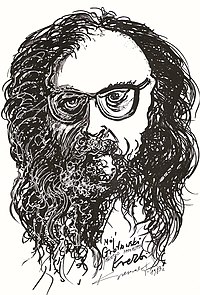Jerzy Grotowski | |
|---|---|
 Grotowski by Zbigniew Kresowaty, c.1972 | |
| Born | 11 August 1933 Rzeszów, Poland |
| Died | 14 January 1999 (aged 65) Pontedera, Tuscany, Italy |
| Occupation | Theatre director |
| Alma mater | Ludwik Solski Academy for the Dramatic Arts in Kraków Russian Academy of Theatre Arts |
| Notable awards | Knight's Cross of the Order of Polonia Restituta (1974) Drama Desk Award for Outstanding Director for The Apocalypse (1970) |
Jerzy Marian Grotowski (Polish: [ˈjɛʐɨ ˈmarjan grɔˈtɔfskʲi]; 11 August 1933 – 14 January 1999) was a Polish theatre director and theorist whose innovative approaches to acting, training and theatrical production have significantly influenced theatre today. He is considered one of the most influential theatre practitioners of the 20th century as well as one of the founders of experimental theatre.[1][2]
He was born in Rzeszów, in southeastern Poland, in 1933 and studied acting and directing at the Ludwik Solski Academy of Dramatic Arts in Kraków and Russian Academy of Theatre Arts in Moscow. He debuted as a director in 1957 in Kraków with Eugène Ionesco's play Chairs (co-directed with Aleksandra Mianowska)[3] and shortly afterward founded a small laboratory theatre in 1959 in the town of Opole in Poland. During the 1960s, the company began to tour internationally and his work attracted increasing interest. As his work gained wider acclaim and recognition, Grotowski was invited to work in the United States and left Poland in 1982. Although the company he founded in Poland closed a few years later in 1984, he continued to teach and direct productions in Europe and America. However, Grotowski became increasingly uncomfortable with the adoption and adaptation of his ideas and practices, particularly in the US. So, at what seemed to be the height of his public profile, he left America and moved to Italy where he established the Grotowski Workcenter in 1985 in Pontedera, near Pisa. At this centre, he continued his theatre experimentation and practice, and it was here that he continued to direct training and private theatrical events almost in secret for the last twenty years of his life. Suffering from leukemia and a heart condition, he died in 1999 at his home in Pontedera.[4]
- ^ "Guide to the Jerzy Grotowski Technique". backstage.com. 15 March 2022. Retrieved 15 April 2023.
- ^ Paul Allain. "Jerzy Grotowski, 1933-1999". totaltheatre.org.uk. Retrieved 15 April 2023.
- ^ "The Chairs". grotowski.net. Retrieved 2024-05-29.
- ^ "Jerzy Grotowski: 'Eccentric genius' who reinvented theatre". Retrieved 2019-09-16.